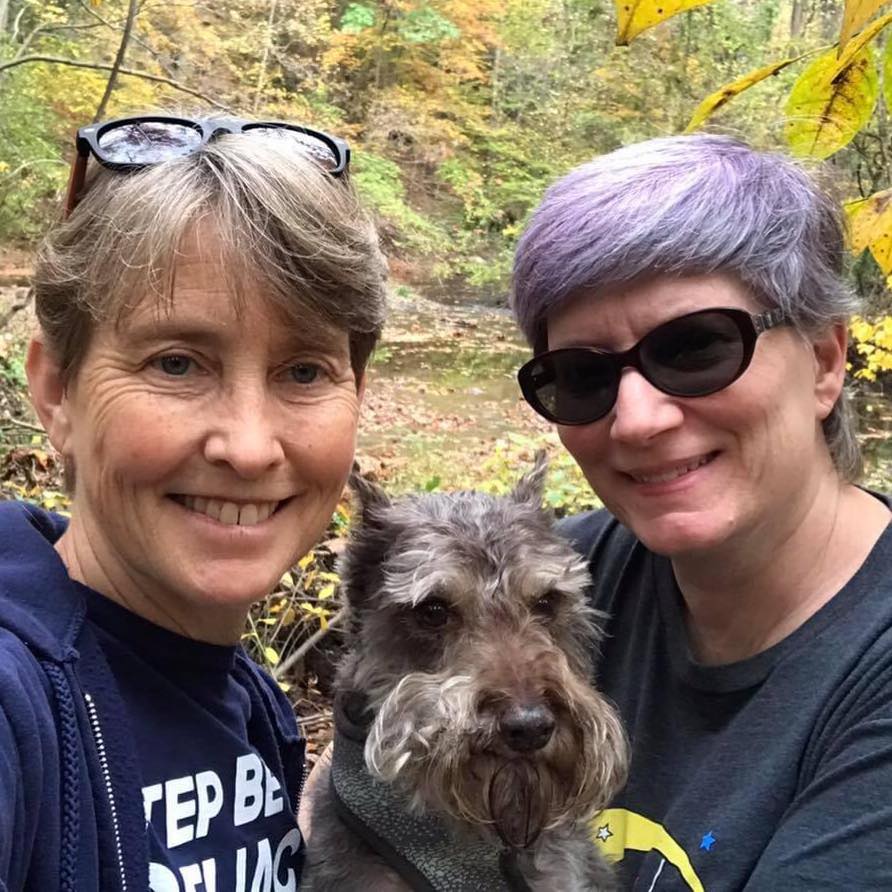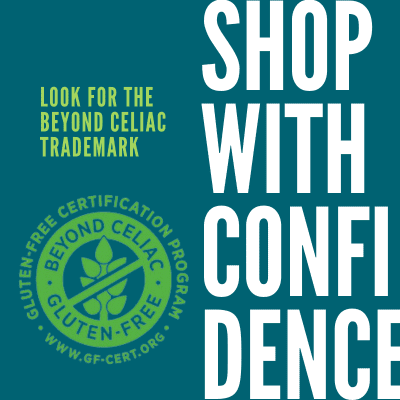Describe your life prior to diagnosis:
Before diagnosis, I was your typical middle-class lesbian, married to my wife since 1994, raising two sons, and managing a dog and a house in the suburbs. I became a vegetarian in 1992, and have lived the vegan life off and on also.
How did you come to know (or suspect) that you have celiac disease?
I had been living with chronic severe anemia since high school, but I had no clue that it was related to malabsorption. Doctors told me that it was my diet and a byproduct of menstruation. In grad school I’d had a bout of terrible GI symptoms that the student health center called colitis. The colitis symptoms got attributed to stress from school. After I left college, my symptoms mostly resolved. After that, I thought of myself as generally healthy—the anemia just a quirk of my physiology. In my 40s, I lost some weight (I thought it was through my awesome, intentional effort!) and had regular bouts of significant GI distress. Using the internet, I self-diagnosed irritable bowel syndrome and decided not to make a fuss, since there didn’t seem to be an effective treatment. If there’s nothing to be done about it, why talk about it, right?
If you were diagnosed, who made the diagnosis?
When I was in my mid-40s, I changed primary care physicians. My new doc was not buying my “anemia-is-normal-for-me” theory. After nearly 6 months of twice-a-day iron supplements with no improvement, she sent me to a hematologist. Surprisingly, he was very interested in my GI situation. After hearing about my symptoms, he said, “I think you have Crohn’s or celiac disease.” I was gobsmacked. While waiting for the results of the celiac disease panel, I started weekly iron infusions. The celiac disease tests came back positive, so he sent me to a gastroenterologist for an endoscopy and biopsy, which confirmed the diagnosis.
How long did it take for you to get diagnosed since your first symptoms and what (if any) challenges did you face along the way?
There’s no way to know when the damage to my villi began, but in hindsight I had symptoms as a very young child. I was plagued with canker sores as a kid and would get terrible stomach aches. The anemia started in high school. As an adult, especially as my GI symptoms got worse, I suffered from poor concentration, migraines, and still got canker sores.
Do you believe anything could have sped up your diagnosis?
There were at least three notable opportunities for a physician who was in-the-know to have considered the possibility of celiac disease. In 1984 I needed to have surgery but I was so anemic that the doctor first did a bone marrow biopsy to see if I had leukemia and gave me an iron infusion before I could have the procedure. I believe that when I was diagnosed with colitis in 1987 it was a misdiagnosis. And I had the same primary care physician throughout my 30s and early 40s who was just not that interested in getting to the bottom of my anemia. In general, I found him dismissive and impatient with me, which is why I finally changed doctors. Within a year I had the answer, not because my new primary care doctor immediately thought of celiac disease, but because she knew to keep digging. Now, of course, she’s much more likely to include the celiac disease blood panel for patients who have unexplained symptoms that might fit.
Describe your experience with living with celiac disease:
Celiac disease became one more thing that made me feel different, and not in a good way. I came out in 1986 in a place where being lesbian was definitely something to be careful about who you shared it with. As a 20-something, I was very concerned about what other people thought of me. Over time, I found a community and heard other people’s stories and built a happy life in which I could be myself in most situations, though I still felt I had to be guarded when meeting new people. I thought of myself as very “out.” My spouse Jenn and I had a commitment ceremony in 1994 with all our family and friends in attendance. But then when we moved to the suburbs and had kids, I found I had to come out over and over again to the other parents on the playground or at school—well-meaning folks who would see how tall my boys were and ask me how tall my husband was—AWKWARD. Getting diagnosed with celiac disease was a little like that. I had never before had to talk about an ongoing health situation, and now I was one of those people. I had to start asking questions about ingredients and food prep and monitoring utensil use. Any time we went out to eat or to a party, I had to make it explicit that I have celiac disease and would get very sick if I ate gluten (my symptoms now are super awful, much worse than prior to adopting the gluten-free diet). It’s like the excessive disclosure to the parents on the playground. Jenn and I used to take a lot of pleasure in traveling and popping into interesting-sounding restaurants that had vegetarian fare. After diagnosis, I felt (and still do, for the most part) confined to boring chain restaurants that have (hopefully) consistent gluten-free protocols.
But just as I molded my life to be a happy one as a member of the LGBTQ+ community, I’ve adapted to living with celiac disease, mostly through home food prep, where my wife and sons are very careful and understanding about my dietary restrictions. Now, I create the interesting foods I would have had at restaurants pre-diagnosis. And I am ridiculously lucky as a Beyond Celiac employee* that any work lunch is awesomely gluten-free!
Is there anything else you’d like to add to your story?
Some people may feel that my sexual orientation is irrelevant to my celiac disease journey. Maybe, but in some ways the two journeys aren’t really that different. In my work as director of communications at Beyond Celiac, I know that some people living with celiac disease have a much harder time with their families either accepting that celiac disease is real or that even small amounts of gluten exposure can cause damage and/or symptoms. Likewise, as the former executive director of Philadelphia’s William Way LGBT Community Center, I know that many in the LGBTQ+ community do not have the love and support of their families. It’s important for each of us to be seen and accepted. That’s why I’m choosing to write my story during Pride Month. I feel exceptionally fortunate that my family of origin and my chosen family are completely loving and accepting of all facets of me. I want to do my part to increase acceptance of and embrace diversity within our celiac disease community.
*Claire was diagnosed with celiac disease in 2010 and joined the Beyond Celiac team in 2014.



